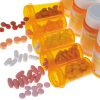- Empty cart.
- Continue Shopping
Pediatric Medication: What Parents Need to Know

Introduction
Administering medication to children is a responsibility that comes with its own set of challenges and concerns. From ensuring the correct dosage to understanding potential side effects, parents need to be well-informed to make the best decisions for their child’s health. This article aims to provide parents with essential information on pediatric medication, including safety measures, common medications, and tips for administration.
Types of Pediatric Medications
Over-the-Counter (OTC) Medications
- Pain Relievers: Acetaminophen and ibuprofen are commonly used for fever and pain relief.
- Cold and Cough Medicines: Decongestants and antihistamines may be used, but consult your healthcare provider for age-appropriate options.
Prescription Medications
- Antibiotics: Used for bacterial infections.
- Asthma Medications: Inhalers and other medications may be prescribed for asthma management.
- ADHD Medications: Stimulant and non-stimulant medications are available for treating Attention Deficit Hyperactivity Disorder.
Safety Measures
Correct Dosage
- Always follow the healthcare provider’s instructions or the guidelines on the medication packaging for dosage.
Administration Tools
- Use the provided syringe, dropper, or measuring cup for liquid medications to ensure accurate dosing.
Storage
- Store medications in a cool, dry place, away from children’s reach.
Expiry Date
- Regularly check and dispose of expired medications.
Allergies
- Be aware of any allergies your child may have and inform your healthcare provider.
Tips for Administration
Timing
- Administer medication at consistent times to maintain therapeutic levels in the body.
Food Interactions
- Some medications should be taken with food, while others should be taken on an empty stomach. Follow healthcare provider’s instructions.
Positive Reinforcement
- Use praise or small rewards to encourage younger children to take their medication.
Open Communication
- For older children, explain the importance of the medication and involve them in the process.
Common Concerns
Side Effects
- Common side effects may include nausea, dizziness, or allergic reactions. Consult your healthcare provider if you notice any unusual symptoms.
Refusal to Take Medication
- If your child refuses to take medication, consult your healthcare provider for alternative forms of the medication or administration methods.
Overdose
- Keep emergency contact numbers handy and seek immediate medical attention if you suspect an overdose.
When to Consult a Healthcare Provider
- Persistent symptoms despite medication.
- Severe or unexpected side effects.
- Questions or concerns about the medication’s effectiveness or safety.
Conclusion
Administering medication to children requires careful attention to detail and open communication with healthcare providers. By being well-informed and taking necessary precautions, parents can ensure the safe and effective use of medication for their children. Always consult your healthcare provider for personalized medical advice and treatment options.








